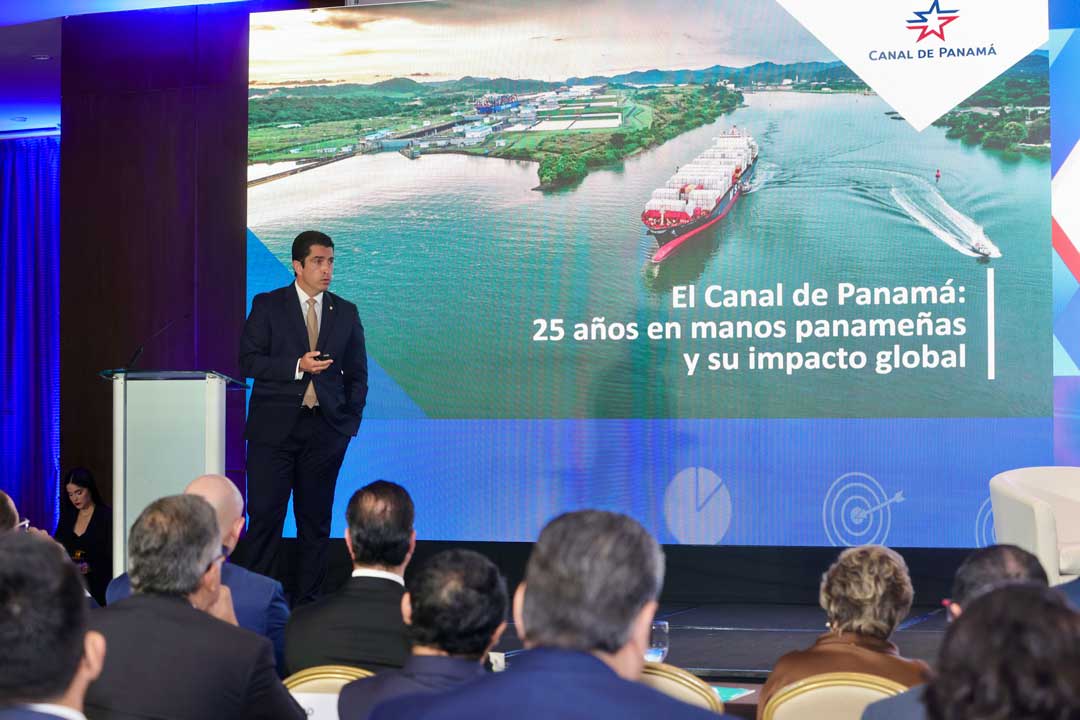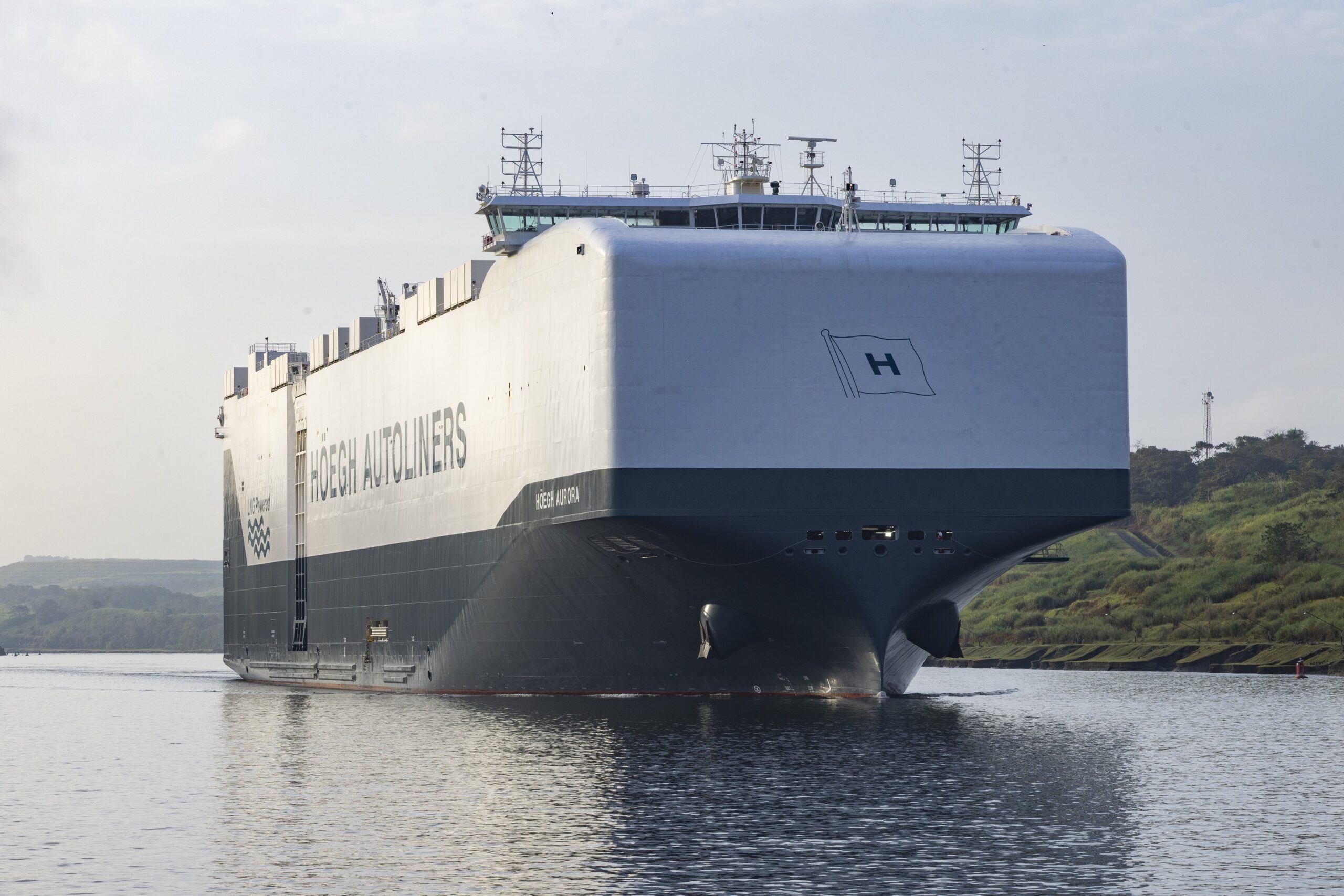-
Reinforces trust and confidence in Canal management and Panama’s economy and political stability
 PANAMA CITY, Panama, December 9, 2008 – Amid a strained and uncertain global economy, one historic construction project continues to reinforce Panama’s economic growth and political stability: the expansion of the Panama Canal. Today, on the heels of Panamanian President Martín Torrijos’ recent expansion financing structure announcement, senior leaders of five multilateral and development agencies convened at Panama’s Ascanio Arosemena Theater with Canal officials to sign an agreement on the financing for the waterway’s expansion.
PANAMA CITY, Panama, December 9, 2008 – Amid a strained and uncertain global economy, one historic construction project continues to reinforce Panama’s economic growth and political stability: the expansion of the Panama Canal. Today, on the heels of Panamanian President Martín Torrijos’ recent expansion financing structure announcement, senior leaders of five multilateral and development agencies convened at Panama’s Ascanio Arosemena Theater with Canal officials to sign an agreement on the financing for the waterway’s expansion.
Representing Asia, Latin America, Europe and the United States, the agency leaders joined President Torrijos, ACP Administrator/CEO Alberto Alemán Zubieta and the ACP Board of Directors for the special expansion financing event, culminating months of extensive negotiations.
“The geographic diversity of the offers and the high profiles of the institutions, demonstrate the international market’s trust and confidence in the high-growth performance of the Panamanian economy and the successful management of the Panama Canal,” said Mr. Alemán Zubieta.
“Today we have reached a major milestone for both the Canal and our country. The support of these major lenders for the largest infrastructure project in Latin America is truly encouraging and inspiring. Thank you for the trust and confidence you have demonstrated for Panama,” he added.
Multilateral and development agency officials in attendance included: Yoshihiko Morita, vice president, Japan Bank for International Cooperation (JBIC); Francisco de Paula Coelho, Latin America and Asia director, European Investment Bank (EIB); Luis Alberto Moreno, president, Inter-American Development Bank (IDB); Enrique Garcia Rodríguez, executive president, Corporación Andina de Fomento (CAF); and, Juan Jose Daboub, World Bank Group managing director, International Finance Corporation (IFC).
Also attending the event was José Miguel Insulza, secretary general of the Organization of American States (OAS).
During the program, President Torrijos and Mr. Alemán Zubieta provided remarks and Mr. Moreno spoke on behalf of the five lenders.
The $2.3 billion financing package will cover a portion of the $5.25 billion total cost of the project and will be allocated as follows:
| ACP EXPANSION PROGRAM FINANCING STRUCTURE | |
|---|---|
| MULTILATERAL AND DEVELOPMENT AGENCIES | AMOUNT |
| Japan Bank for International Cooperation (JBIC) | $ 800 million |
| European Investment Bank (EIB) | $ 500 million |
| Inter-American Development Bank (IDB) | $ 400 million |
| Corporación Andina de Fomento (CAF) | $ 300 million |
| International Finance Corporation (IFC) | $ 300 million |
(Note: Amounts listed in U.S. dollars.)
The negotiated financing structure includes favorable provisions for the ACP including a 20-year amortizing period with a 10-year grace period and establishes an unsecured, untied financing for the ACP, whereby there are no prerequisites to contract from any one source.
The ACP reached a “Common Terms Agreement” with the five agencies whereby the agencies agreed to equivalent terms and conditions within the financing structure.
Considering the overall competitiveness of the Panama Canal route, the remaining amount for the project will be financed through Canal-generated cash flow.
“I would like to congratulate His Excellency Martín Torrijos, the Panamanian government and all Panamanians for having the long-term vision to allow this project to become a reality,” said IDB President Luis Alberto Moreno. “The solid financials, the excellent management record, robust governance and social responsibility of the ACP are proof that its leader, Mr. Alemán Zubieta, and his team, make the ACP a model to follow for other companies in Panama, Latin America and the world.”
“I would like to recognize President Torrijos for planting the seeds for Panama in the past few years that will put the country on a path to prosperity that history will acknowledge. You are setting the foundations for a better tomorrow for all Panamanians, as has been your wish,” he added.
Since July 2007, the ACP, in conjunction with its financial consultant, Mizuho Corporate Bank, Ltd., and its international legal advisor for financing, Shearman & Sterling, has been approaching financial institutions to determine the most viable financing for the waterway’s Expansion Program. The process began in Panama and continued with presentations to a number of financial institutions in New York, Washington, Hong Kong and London.
Recently, the ACP received its first-ever prospective investment grade rating. Moody’s Investors Services, one of the world’s top credit rating agencies, gave the ACP an A1 as a government-related issuer, and a prospective A2 investment grade for the $2.3 billion financing for the expansion project – thus reaffirming Panama’s growing presence in the international marketplace.
Since the handover of the Canal from the United States to Panama on December 31, 1999, the ACP has shifted its operations from a profit-neutral utility to a market-oriented business model – one that is focused on customer service and reliability. Under ACP management, there has been a significant reduction in the time it takes to transit the Canal, an increase in tonnage transiting the waterway and a spike in transits of Panamax-size vessels.
Expansion will build a new lane of traffic along the Panama Canal through the construction of a new set of locks, which will double capacity and allow more traffic and longer, wider ships.
About the Panama Canal Authority
The Panama Canal Authority (ACP) is the autonomous agency of the Government of Panama in charge of managing, operating and maintaining the Panama Canal. The operation of the ACP is based on its organic law and the regulations approved by its Board of Directors. For more information, please refer to the ACP’s Web site: http://www.pancanal.com.




